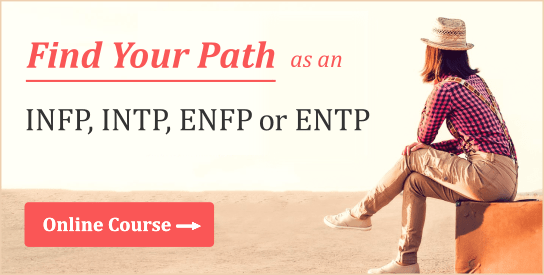
Like other types, INTPs and INFPs instinctively want to marry their dominant and inferior functions. For INTPs, this means reconciling their individual Ti (Introverted Thinking) methods with a broad Fe (Extraverted Feeling) philosophy. Similarly, INFPs, seek to reconcile their unique Fi (Introverted Feeling) preferences with an objective Te (Extraverted Thinking) worldview. What these types often fail to realize, however, is that this reconciliation is unlikely to occur in the first half of life. This is because INPs must first thoroughly consult and develop their auxiliary and tertiary functions (Ne & Si) before they can reach a confident Fe or Te conclusion (see Elaine Schallock’s Maze Metaphor for more on this). In short, they need a great deal of time to test and experiment with a breadth of Ne (Extraverted Intuition) ideas before they can reach a point of J conviction and certainty.
When INTPs and INFPs try to latch onto a single theory or identity, they typically end up changing their mind in a matter of time. This leaves them feeling depressed, disoriented, and directionless. They go from a blissful sense of having THE answer to the dreadful feeling that they know nothing at all; they “throw out the baby with the bathwater.” They don’t rely enough on memory (Si) to recall where they’ve been and what they do know with a good measure of confidence. Instead, they allow their Ne (Extraverted Intuition) to clear the slate of any sense of convergent knowing or meaning whatsoever.
This problem not only manifests in INP’s search for truth, but also in their careers and relationships. This is partly because INPs often look to their philosophy of life as the platform for their careers and relationships. So if they feel lost as far as “knowing themselves” or knowing their philosophy, they can feel paralyzed with regard to selecting a career or relationship. They may feel they cannot authentically function in a job or relationship until having clearly defined who they are and what they believe. They therefore delay action in favor of continued contemplation. INPs have even been known to suddenly abandon their careers or relationships if they no longer align with their current understanding. Again, this is attributable to the extreme thinking involved with trying to quickly appease their inferior function’s desire for a convergent endpoint.
A More Balanced Approach for INTPs & INFPs
In order to avoid this emotional rollercoaster, INTPs and INFPs should first recognize they are not J-types. Their job is not to know or proffer convergent J answers early in life. Instead, INPs are designed to explore and critique Ne ideas and possibilities. Their role more closely resembles that of artist, skeptic, critic, or tinkerer than that of scientist or prophet. Thus, INPs need to be okay with leaving the J theory open-ended. Yes, they will gradually develop and refine their understanding of themselves and the world over time, but they need to resist the allure of the “shotgun approach” where they (or their current favorite theorist) can get everything settled in one day. For INPs who don’t buy into what I’m saying, simply consult your own experience and see if the “one and done” approach has ever worked for you in the past.
Instead of constantly straining to once-and-for-all define themselves or their worldview, INPs simply need a general orienting direction. Like other types, they need some degree of direction in their lives. In order to identify this general direction, INPs might consult the past (Si) (this is especially true for INPs in their late twenties or older) rather than constantly conjuring brand new options a la Ne. They can use Si to recall their historical skills and interests, which in all likelihood are not going to change drastically, at least not in any enduring sense. This holds true for their careers and relationships as well. So instead of dispensing with their current career, INPs are often better off looking for ways to function more authentically within their current field. In doing so, they need to be careful not to allow idealism to enter the picture too strongly, since idealism, when disappointed, can quickly degenerate into extreme cynicism. The general purpose should be to identify/create work that allows for the consistent use of their top two functions in a field that they are generally interested in or believe in. That’s it. No need to keep asking if it is the “ideal” career field. As hard as it may be at first, they need to trust that the J endpoint will take care of itself in time.
Closing Thoughts
Because their inferior function wants convergent answers, it can be easy for INTPs and INFPs to assume that answers are all the world wants from them. They assume the world has no use for their questions, their skepticism, or their endless supply of Ne options or possibilities. But these assumptions are merely projections of their own subjectivity. The truth is that the world needs them to ask probing questions, to poke holes in existing theories, and to provide creative or explorative “food for thought.” We see similar faulty assumptions among INJs who project that what the world really needs from them is more art pieces rather than Te or Fe insights, answers, or analyses. This of course, is why typology can be so valuable, revealing the common stumbling blocks associated with each type’s inferior function.
If you’re an INFP or INTP looking to clarify who you are, what you believe, or where you are headed, you’ve come to the right place. Not only have we written extensively about these types in our books and online articles, but we’ve also developed an online course, Finding Your Path as an INFP, INTP, ENFP or ENTP, which has proven very helpful to INPs seeking to better understand themselves and their path in life. So if you haven’t done so already, take a moment to learn more about the course→
Related Posts:
Why INTPs Seek (& Struggle to Find) Convergent Truth


andrea says
This article really is timely for me as an INFP on the brink of turning 30….a few weeks ago, I was going through yet another “existential crisis” as I have come to describe them, and was just worn out by it all. In the midst of it, i told my husband, “maybe i just need to own up to the fact that i am a seeker and always have and always will be.” The thing is, “seeker” just seemed to me to have a vibe of being immature and wishy-washy. I grew up in an environment that subtly emphasized unwavering beliefs. Plus as an INFP I am so concerned with finding that J answer that will satisfy my questions forever, and it just won’t come!
Over the years, I have tried on various worldviews and life philosophies….tried the vegetarian/natural health thing, tried the skeptical science/atheist thing, tried the uber conservative thing, the liberal thing…all quietly in my mind of course lol. I grow tired of this overhauling of worldviews, as it often sometimes means overhauling certain possessions on a whim (I remember I threw out all my make up when I went through the “wear no make up” phase)…. but I have found it happens less the older I get. I like the advice to consult the Si, that is super helpful and I will keep that in mind.
I have found my Si has really come into play lately with things. I have discovered that it is ok to indulge my Si and just take a more balanced “mainstream” approach to life- A lot more “normal”, but it helps calm my mind , and I feel happier . Coming to terms with being a “seeker”, but allowing my past experience to temper my seeking when it gets too confusing. It is liberating to also not have to put a label on my worldview. I am a little old-fashioned and a little free-spirited, there is no “side” I have to be on!
Emma says
Reading this, I wondered if it was me in the future (haha but I’m 16 and this sounds just like something I would say). I’ve already had multiple philosophies and tend to define and remember each stage of my life based on my “philosophy” (to the extent a kid can have one) at that time. They tend to line up with my current obsession of the time too. I loved old-fashioned things, then I needed everything to be natural, then I thought friendship was above all else, and now I’ve settled (for the time being) on a philosophy of doubt, questioning whether anything exists.
Anyway, glad someone gets it!
Su says
Thank you. I am a 32 INFP and I feel really bad when people ask me about what I want to achieve in life. I never have a stable career and I am unable to state where I want to be in my career.
The advice helps a lot.
Annika says
The two previous posters (Andrea and Su) seem to be speaking in my own voice. It’s shocking how much we have in common. I am a female INTP and have never had a stable career. I constantly find myself making a decision about what I should do with my life only to change my mind one or two days later (much to the frustration of my husband). Each time I feel certain I have found the answer, but then doubt creeps in and I research more and I look for a definite sign and it all crashes down around me.
I have taken just about every subject in school and always received very high marks, the problem is not competency. I’ve gotten into 3 universities and then abandoned them because I wasn’t sure what I wanted to do. Its so frustrating!
Thank you so much for publishing this. It has helped me more than any therapist or web site ever has. I finally feel like I understand myself.
Andrea Chávez says
This is so funny, my name is also Andrea, I´m about to turn 30, it feels as if I was reading about my own life. Sometimes I damn this personality, so undefinite, so picky, so unstable, so frustrating, so fleeting, I despise it at times, for I feel there is no use or purpose for it in this world. I feel, insecure and childish, like a total failure. I just hope I get to accept it in time, be content and own it no matter what…
N. W. says
One thing: I spent several years in college changing majors (but somehow by the end of each and every semester having changed it “back” to Philosophy — so my transcript looks like I was “always” a Philosophy Major). Because of my indecisiveness I couldn’t really get anything done. But then one day I finally threw in the towel and left my major as-is (i.e. Philosophy) and decided I would simply fly, semester to semester, by the seat of my pants. Lo and behold: I completed the degree. It was when I said “I just don’t care anymore” that I finally started getting things done.
Pirandola says
Very confusing indeed. Here I am about to retire from a career in IT (which I long ago stopped liking) and thinking of what I will do………I now want to go into alternative thereapies????
Oh well the INFP nightmare.